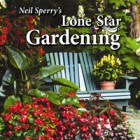Bed Prep Tip from Neil
If you’re trying to improve a tight Texas clay soil, organic matter is still a great start. It comes in many different forms, from brown Canadian peat moss to compost, rotted manure, finely ground bark mulch and humus from the floor of the forest. Organic matter, in fact, not only loosens tight clays, but it helps sandy soils retain water and nutrients.
However, there is yet another ingredient to stir into your mix. It’s called expanded shale, and it’s been given high marks by Dr. Steve George of the Texas Cooperative Extension. The close-up you see shows a Shumard red oak leaf for scale. This photo was taken this Monday, and the bed was tilled on Tuesday. This is the same new bed you see in From the Sperry Garden in this issue. I used expanded shale in one prime part of the bed, where I intend to plant flowers in a couple of months.
Expanded shale is a clay material that expands when heated and dried. It makes a comparatively heavy soil amendment, so it certainly won’t wash in heavy rains (unlike organic matter and perlite). It’s porous, so it retains moisture and even nutrients better than the washed brick sand we used to suggest. I spread a 1-inch layer over the bed, along with several inches of organic matter, prior to tilling. And, the best news is, the expanded shale will still be there 5 and 15 years down the road. Since it’s stone-like, it doesn’t decay.
More and more nurseries are offering expanded shale. It is sold both in bags and in bulk. Call ahead. If they don’t have it, they can get it for you. Although it can be a little bit pricey, it’s a investment that keeps on repaying.

